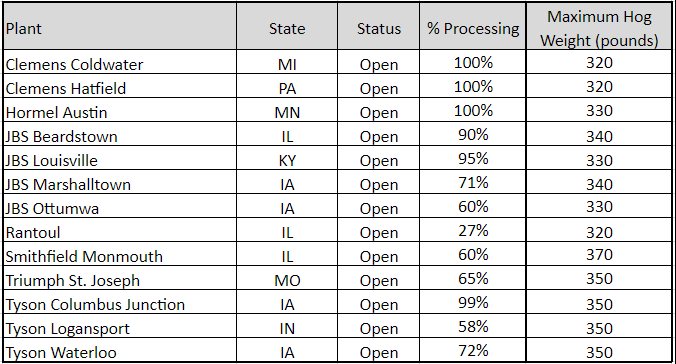Carthage Veterinary Service COVID-19 Pork Industry Update May 15, 2020
-
Carthage Veterinary Service is working diligently to support you and the industry through the current crisis. This is a status update to hit industry highlights and our focus on the following 3 KEY areas:
-
- Keep packing plants running in full production
- If required, support depopulation and disposal
- Indemnity payments for loss of livestock
Keeping Plants Open
-
- Regional idle plant capacity has improved to 23% as COVID-19 outbreaks at plants have slowed, though some states are just now seeing peaks of virus curves. The more important issue facing plants will be employees getting extremely fatigued in the wake of those absent and no shows. Absenteeism at plants due to fatigue is likely the next issue that will determine processing capacity.
- Week 20 data through Thursday has total head slaughtered at 1.3M while carcass weights continue to rise and hit over 220 lbs this week. Final market data for the week will be included in our report next week.
- The CVS Records Department has developed a new report summarizing slaughter numbers, hog prices, and packer cutout prices from across the industry. The CVS Hog and Pork Slaughter Data Weekly Report will be uploaded to our COVID-19 Resources webpage every Monday with the previous weeks data. We will update this report daily though, so if you have any questions about price trends or slaughter numbers during the week please reach out to Brianne Skien (bskien@hogvet.com) or Beau Peterson (bpeterson@hogvet.com) for more information. The first report will be uploaded on Monday, May 18, with data from this week.

Depopulation and Disposal
-
- CVS received two grant approvals from the NPB to evaluate electrocution euthanasia in wean pigs and sodium nitrite for grow-finish pigs. Trials have been started and we will share more information as it is available.
Indemnity
-
- No new updates on indemnity – NPPC continues to lobby congressional and government agencies on your behalf.
Updates
-
- HEROES Act – Livestock Provisions - The House is expected to vote today on the legislation. Key highlights include:
- Emergency Assistance for Market-Ready Livestock Losses - This section provides emergency funding for depopulation of market-ready livestock and poultry due to COVID-19. It covers depopulation retroactive to March 1. The assistance for covered producers begins at 85 percent of the value of losses and is reduced by 10 percent increments every 30 days (85 percent for the first 30 days, followed by 75 percent for the next 30 days and so on). The start date begins for each covered producer once they start to euthanize animals. The value of losses is defined as the national average market value of market-ready livestock, as determined by the USDA secretary, beginning March 1 and ending on the date of the bill's enactment. Packer-owned animals are excluded from participating. The legislation is an uncapped appropriation which provides "such sums as may be necessary to carry out this section." This provision, if enacted, would provide significant financial support to U.S. hog farmers who must euthanize their animals.
- Direct payments to Agriculture Producers - This section provides $16.5 billion available at the start of the second quarter and through the end of the year for direct payments to agricultural producers to cover losses due to COVID-19 market disruptions. Specifically, for those eligible under USDA's aid package earlier this year, the agency will compensate hog farmers and other producers at 85 percent of actual losses, as estimated by the USDA secretary. To be eligible, at least 75 percent of a producer's adjusted gross income must be derived from farming, ranching or forestry-related activities. Like the funding passed by Congress previously in the Coronavirus Aid, Relief, and Economic Security (CARES) Act, this provision does not include payment limitations. However, USDA has discretion to impose payment limitations. USDA has not yet published the rules which will govern the previous funding appropriated by Congress in the CARES Act. NPPC continues to push for no payment restrictions on any of the COVID-19 farm aid so that all hog farmers are eligible.
- Emergency Assistance Under the Commodity Credit Corporation - This provision amends the CCC Charter Act to specifically allow USDA to use CCC funding to reimburse producers for euthanasia, removal and safe disposal of livestock due to supply chain interruptions during a public health emergency. The CARES Act authorized $14 billion in replenished funds for the CCC, effective July 1, 2020.
- USDA CFAP (Coronavirus Food Assistance Program
- Applications are not being accepted yet, but encourage any clients that are not existing customers of FSA to contact your local branch now to get preliminary forms filled out. Forms are also available at www.farmers.gov/cfap.
- Producers who applied for PPP or EDIL are still eligible to apply for CFAP.
- IDOT Extends the Overweight Movement of Loads Waiver
- Runs now through May 29, 2020.
- Will allow overweight and over dimension loads as long as they comply with restrictions listed.
- This order does not apply to posted bridges, and local highways with special and seasonal weight postings. Haulers must verify their route using www.gettingaroundillinois.com to ensure their route is free of size and weight restrictions.
- A waiver issued under this order does not authorize the operation of any vehicle combination at a maximum gross weight in excess of 90,000 pounds on 5 axles, or an additional 12% above legal loads on fewer axles.
- HEROES Act – Livestock Provisions - The House is expected to vote today on the legislation. Key highlights include:
